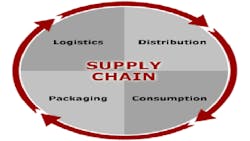Industry clusters like technology in Silicon Valley and automobiles in Detroit are believed to foster economic growth by attracting specialist suppliers to co-locate with the producers, which can help support invention, production, and distribution.
But new research by U-M Ross Professor Maxim Sytch shows there's a downside to supplier proximity. His analysis shows specialized service suppliers, when located near their client customers, eventually induce demand for their services and that could actually stunt the growth of an industry cluster.
"I find the influence of this specialist supplier base is not always positive," says Sytch, the Sanford R. Robertson Assistant Professor of Business Administration and assistant professor of management and organizations. "At first, they are naturally attracted to these geographic clusters because there's demand. But after a while, the proximity enables suppliers to induce demand that's unrelated to customer needs. It produces no noticeable gain for the customer firms and, in fact, limits the growth possibilities of a region because it increases economic and transaction costs."
Sytch studied the role intellectual property (IP) law firms played as specialist suppliers of legal services to biotechnology and pharmaceutical firms. He studied the patterns of co-location among law firms' offices and biotechnology and pharmaceutical companies, the amount of patent litigation that followed, and the outcome of the litigation.
Biotech and pharma companies with IP firms nearby are more likely to get involved in patent litigation, the lawsuits last longer, and there's no noticeable benefit for the client company. That's the conclusion of his paper, "Where Do Lawsuits Come From? The Role of Spatial Distribution of Principals and Legal Mediating Agents."
"The underlying mechanism here is social influence by lawyers as carriers of expert knowledge," he says.
It's not that intellectual property law firms are doing anything unethical or wrong. The incentives for lawyers to bring in new business and increase billable hours promote aggressiveness in representing their clients. Proximity allows sustained social contact with companies to influence toward aggressive and often protracted legal action.
The matters are further complicated by the specialized nature of patent law and IP litigation. Patent litigation is very sophisticated and in-house counsels of corporations — even those of biotech and pharma companies — can't always get a handle on it. So they rely on the expertise of nearby suppliers. One finding in particular amplifies that point: This effect was more profound in states with a more uncertain legal environment, which heightens the influence of lawyers as carriers of expert knowledge.
"This is emblematic of a more general tendency in human behavior where we rely on experts and their advice to help us deal with uncertainty," Sytch says.
So how can companies get a better idea of what's necessary from a specialty supplier? The less a company knows about an issue, the more unusual the challenge is, the more it relies on a niche supplier. So recognizing this tendency and perhaps gaining some additional expert knowledge in a critical area — such as intellectual property in biotech and pharma — would be a good start. Full-scale outsourcing comes with risks.
"The less comfortable you are about coping with uncertainty yourself, the more you are at the mercy of expert advice," he says. "Also, people are particularly prone to influence through face-to-face interactions. So if you suspect instrumental pursuits by others, consider using other means of communication, such as email or phone."
Note: This article originally appeared on The Ross School of Business, University of Michigan website.
